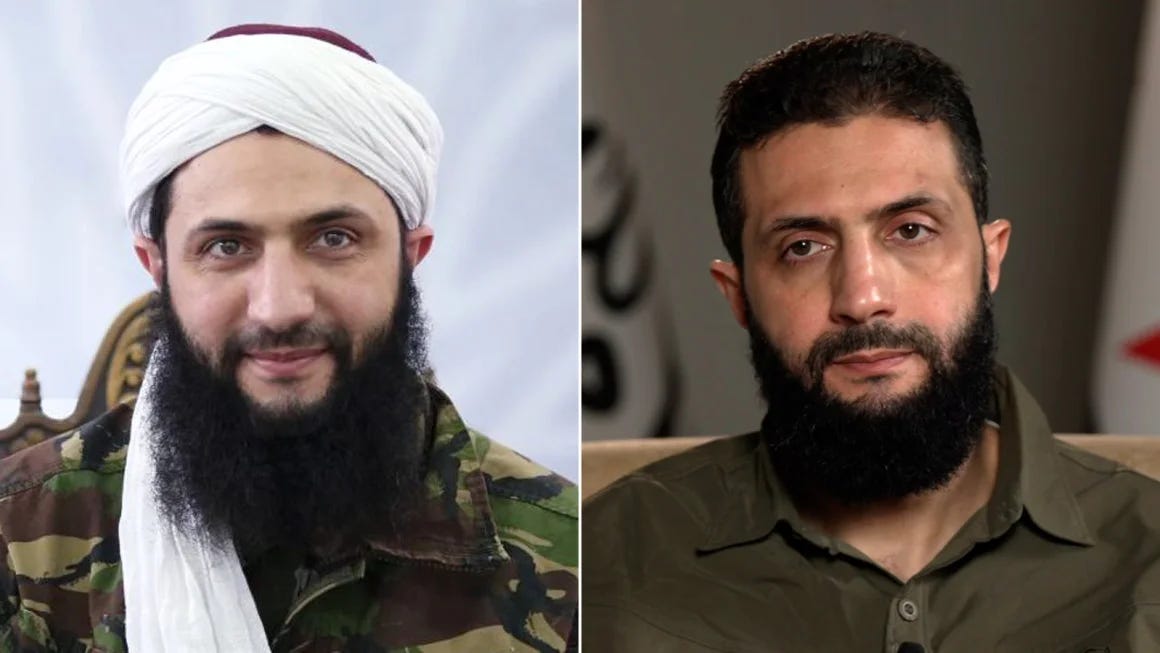Jeremy Bowen's excruciating interview with the new ruler of Syria
The BBC’s International Editor looked like a little boy with his big brother
It was while scrolling on X that I first encountered Jeremy Bowen’s excruciating interview with Abu Mohammed al-Jolani, the leader of Hayat Tahrir al-Sham (HTS), the new terror overlords of Syria. The video began playing automatically without sound. Even then it struck me as bizarre.
The body language! There was the murderous Jolani – an erstwhile jihadi who bounced between the group that committed the 9/11 atrocities and the one that beheaded James Foley – swaggering along the cavernous corridors of Assad’s presidential palace. And beside him scurried the BBC’s International Editor, all starry-eyed and smiley, like a little boy with his big brother.
I tapped the screen to turn on the sound. Not one of Bowen’s questions addressed Jolani’s bloodthirsty jihadi past; his apparent pivot to conservative Islamist authoritarianism; or the way in which his group celebrated on October 7 and eulogised Hamas leaders. In fact, the only time the BBC man pushed a point was when asking when alcohol would be available in Syria (to be fair, I know the feeling).
The other day, I asked a diplomat friend who had met Jolani recently whether he thought he had genuinely reformed. “Definitely not!” came the reply. Interestingly, however, he added that the warlord had spoken “more pragmatically about Israel than we had expected”, with none of the anti-Israel rhetoric one might have expected from the Muslim Brotherhood; the last thing Jolani wants is another war. The fact that the starstruck BBC man neglected such subjects as these made for a superficial interview.
How would Bowen have interviewed Benjamin Netanyahu, I wondered? Would he have been equally gracious, complimentary and accommodating? Would he heck. He would have gone in hard on the casualty count in Gaza. By contrast, in the soft-soap treatment doled out to the conquering Islamist chieftain, Bowen didn’t use the word “civilian” once.
It all brought to mind the question of the media’s relationship with Islamist fanatics. While all journalists rightly hated Islamic State, such discernment isn’t seen with their cousins such as Hezbollah and Hamas.
Last week, Andrew Fox revealed that only five per cent of broadcasters cited casualty figures issued by the Israeli authorities, while 98 per cent relied on the cooked-up propaganda data of Hamas. Ninety-eight per cent! Bowen’s interview with Jolani was an extension of the same derangement syndrome.
Dr Orli Peter, a neuropsychologist and trauma specialist, has an interesting way of thinking about this. In a fascinating essay for the Jewish Chronicle, she laid out the difference between “cognitive empathy” and “emotional empathy”. Psychologically speaking, she explained, jihadi spokesman and Western journalists are mirror images of one another.
“Cognitive empathy is the ability to accurately understand and model the thoughts, feelings and values of others,” she wrote. “It’s like hacking into someone else’s algorithm for how they think and feel, enabling you to predict their reactions to your actions. On the other hand, emotional empathy – what the West excessively values – is the ability to feel what you believe the other person is experiencing.”
This makes a lot of sense. Unsurprisingly, head-hacking Islamist propagandists are not known for their emotional empathy. But they are clever; they have developed a deep understanding of the way the Western mind works and are able to manipulate their messaging accordingly.
That is why Jolani has eschewed his jihadi combat gear and turban in favour of smart shirts and jackets, complemented by a carefully trimmed beard. And that is why, as the Islamic Jihad spokesman Tarek Abu Shaluf revealed in April, “We don’t speak to [Western media] in the language of violence, destruction and revenge… The international media differs from the Arab ones, they focus on humanitarian issues.”

By contrast, Western journalists have very little cognitive empathy for the likes of HTS or Hamas. They simply don’t understand how they think. Instead, reporters often suffer from the myopic “Wykehamist fallacy”, which assumes that at the heart of even the most savage holy warrior lies a civilised man with inherent good taste who might have done very well at Winchester.
When it comes to emotional empathy for the underdog, however, Westerners have it in spades, even when the suffering is fabricated. When Hamas broadcasts heartwrenching footage of dead or wounded Palestinian civilians, we don’t ask the logical questions: is this authentic? Was it intentional? Why don’t we ever see film of dead or wounded terrorists? (Answer: Hamas censorship.) Most importantly of all, is it not crucial to mention that proportionally fewer civilians are being killed by Israel than any other army in history?
As Dr Peter explains, cognitive empathy takes effort to construct, whereas for Westerners at least, emotional empathy is involuntary. That is why the jihadi propaganda effort has been so astonishingly successful over the last 14 months, winning the hearts and minds of millions simply through the force of triggering emotional responses, bypassing the rational mind. The end-point of this? Queers for Palestine. That and the unedifying spectacle of the encounter between Mohammed al-Jolani and the doe-eyed naïf, Jeremy Bowen.


